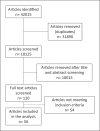European Association for the Study of Obesity Position Statement on Medical Nutrition Therapy for the Management of Overweight and Obesity in Adults Developed in Collaboration with the European Federation of the Associations of Dietitians
- PMID: 36521448
- PMCID: PMC9889729
- DOI: 10.1159/000528083
European Association for the Study of Obesity Position Statement on Medical Nutrition Therapy for the Management of Overweight and Obesity in Adults Developed in Collaboration with the European Federation of the Associations of Dietitians
Abstract
Introduction: Obesity affects nearly 1 in 4 European adults increasing their risk for mortality and physical and psychological morbidity. Obesity is a chronic relapsing disease characterized by abnormal or excessive adiposity with risks to health. Medical nutrition therapy based on the latest scientific evidence should be offered to all Europeans living with obesity as part of obesity treatment interventions.
Methods: A systematic review was conducted to identify the latest evidence published in the November 2018-March 2021 period and to synthesize them in the European guidelines for medical nutrition therapy in adult obesity.
Results: Medical nutrition therapy should be administered by trained dietitians as part of a multidisciplinary team and should aim to achieve positive health outcomes, not solely weight changes. A diverse range of nutrition interventions are shown to be effective in the treatment of obesity and its comorbidities, and dietitians should consider all options and deliver personalized interventions. Although caloric restriction-based interventions are effective in promoting weight reduction, long-term adherence to behavioural changes may be better supported via alternative interventions based on eating patterns, food quality, and mindfulness. The Mediterranean diet, vegetarian diets, the Dietary Approaches to Stop Hypertension, portfolio diet, Nordic, and low-carbohydrate diets have all been associated with improvement in metabolic health with or without changes in body weight. In the November 2018-March 2021 period, the latest evidence published focused around intermittent fasting and meal replacements as obesity treatment options. Although the role of meal replacements is further strengthened by the new evidence, for intermittent fasting no evidence of significant advantage over and above continuous energy restriction was found. Pulses, fruit and vegetables, nuts, whole grains, and dairy foods are also important elements in the medical nutrition therapy of adult obesity.
Discussion: Any nutrition intervention should be based on a detailed nutritional assessment including an assessment of personal values, preferences, and social determinants of eating habits. Dietitians are expected to design interventions that are flexible and person centred. Approaches that avoid caloric restriction or detailed eating plans (non-dieting approaches) are also recommended for improvement of quality of life and body image perceptions.
Keywords: Guidelines; Medical nutrition therapy; Obesity; Weight loss.
© 2022 The Author(s). Published by S. Karger AG, Basel.
Conflict of interest statement
The authors have no conflicts of interest to declare
References
-
- Obesity [cited 2022 Feb 16]. Available from: https://www.who.int/westernpacific/health-topics/obesity.
-
- Burki T. European Commission classifies obesity as a chronic disease. Lancet Diabetes Endocrinol. 2021;9((7)):418. - PubMed
-
- OECD . The heavy burden of obesity: the economics of prevention. Paris: Organisation for Economic Co-operation and Development; 2019. [cited 2022 Feb 17]. Available from: https://www.oecd-ilibrary.org/social-issues-migration-health/the-heavy-b....
-
- World Health Organization. Regional Office for Europe . Regional Office for Europe. World Health Organization; 2022. WHO European regional obesity report 2022; p. p. 206. [Internet] [cited 2022 Jun 8]. Available from: https://apps.who.int/iris/handle/10665/353747.


